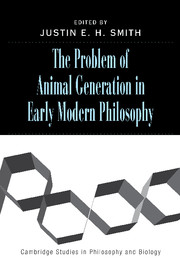Book contents
- Frontmatter
- Contents
- List of Contributors
- Introduction
- I THE DAWNING OF A NEW ERA
- II THE CARTESIAN PROGRAM
- III THE GASSENDIAN ALTERNATIVE
- IV SECOND-WAVE MECHANISM AND THE RETURN OF ANIMAL SOULS, 1650–1700
- V BETWEEN EPIGENESIS AND PREEXISTENCE: THE DEBATE INTENSIFIES, 1700–1770
- VI KANT AND HIS CONTEMPORARIES ON DEVELOPMENT AND THE PROBLEM OF ORGANIZED MATTER
- VII KANT AND THE BEGINNINGS OF EVOLUTION
- 16 Kant and the Speculative Sciences of Origins
- 17 Kant and Evolution
- Bibliography
- Index
16 - Kant and the Speculative Sciences of Origins
Published online by Cambridge University Press: 06 August 2009
- Frontmatter
- Contents
- List of Contributors
- Introduction
- I THE DAWNING OF A NEW ERA
- II THE CARTESIAN PROGRAM
- III THE GASSENDIAN ALTERNATIVE
- IV SECOND-WAVE MECHANISM AND THE RETURN OF ANIMAL SOULS, 1650–1700
- V BETWEEN EPIGENESIS AND PREEXISTENCE: THE DEBATE INTENSIFIES, 1700–1770
- VI KANT AND HIS CONTEMPORARIES ON DEVELOPMENT AND THE PROBLEM OF ORGANIZED MATTER
- VII KANT AND THE BEGINNINGS OF EVOLUTION
- 16 Kant and the Speculative Sciences of Origins
- 17 Kant and Evolution
- Bibliography
- Index
Summary
INTRODUCTION
Kant pretended to expertise in many nonphilosophical subjects, including the history of civilizations and infant care. He offered up his thoughts on human evolution, skin coloration, formative forces, and competitive social behavior in numerous essays and reviews, and he also composed an essay on animal form, the Critique of Judgment, Part II. One might suppose him to be a key contributor to the flowering of the human and social sciences in the eighteenth century, not their unhappy observer. Yet, as John Zammito has noted in his insightful study of the Critique of Judgment, there is something remarkable about Kant's attitude. His desire to affirm the utter mystery of life and the inexplicability of its origins and the distinction between man and the rest of nature left him, in Zammito's terms, “sharply estranged from the [eighteenth century's] most effective currents.” “A large part of [Kant's] critical philosophy,” he suggests, “can be interpreted as an effort to balance his recognition of the limitations of speculative rationalism or ‘dogmatic metaphysics’ with his recognition of the essential human interest in metaphysics, the unavoidable problems of God, freedom and immortality.” Zammito argues that “Kant's personal commitment to a ‘theistic’ if not outright Christian posture strongly colored the ultimate shape of his work.”
An example of this pattern of partial engagement with and partial estrangement from the life sciences can be found in Kant's writings on generation.
- Type
- Chapter
- Information
- The Problem of Animal Generation in Early Modern Philosophy , pp. 375 - 401Publisher: Cambridge University PressPrint publication year: 2006

